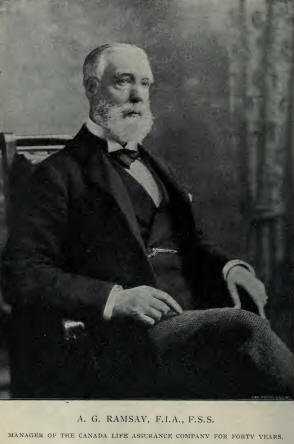|
BY FRED HOWARD ANNIS.
THE art and science of
life assurance has no higher or better exponents than have been given to
the world by Scotland.
The practice of this most
benevolent of man's institutions has been raised by Scotsmen to the
level of the liberal arts and refined to an exact science.
Two of the greatest life assurance
institutions in the world to-day are the Scottish Widows' Fund of
Edinburgh and the Standard Life also of that city which the sons of
Scotia so love to hear called "The, Modern Athens."
There is something in the Scotsman's genius
for finance that, coupled with his characteristic carefulness about
everything he does, especially in money matters, which peculiarly fits
him for excellence in the conduct and management of life assurance
companies. Scotsmen
carry this characteristic with them to every country they make their
own, and there's no denying they are the financial masters of more
communities, if not countries, than any other race of men, as witness
Canada and other parts of the British Empire, as Australasia; and also
the United States, where the most successful men in business and finance
to-day are Scotsmen.
How very clear this is, when Canada is the
country under consideration, may be seen when one surveys the financial
field and marks the men who are the executive heads of the leading life
assurance companies.
Of British life assurance companies whose
Canadian branches are managed by Scotsmen, the Standard Life is an
example in the person of Mr. W. M. Ramsay, Montreal.
Canadian companies whose managers are
Scotsmen may be instanced by the Confederation Life in Mr. J. K.
Macdonald, the Sun Life in Mr. R. Macaulay, and especially the Canada
Life in Mr. A. G. Ramsay.
What is it about the Scotsman that has
enabled him to beat all competitors in the field of finance?
What is the essence or spirit of his genius
for making a success of whatever he turns his hand to when money is
concerned? Thrift
is the national trait of the Scot.
He is long-headed.
Putting by his savings against a rainy day
is typical of the man who proudly claims as his native land that
heather-blown country north of the Tweed.
Life assurance is simply co-operative
saving. The life assurance company is an aggregate of personal units,
each of whom gains by the added strength of the savings of all the
others. Hence the business of managing a life assurance company fits in
with the natural bent of the Scotsman.

For the purpose of enquiring into the reason
of this remarkable success of the Scotsman, in the special branch of
finance constituted by life assurance, perhaps the last named of the
three Canadian companies instanced, viz.: the Canada Life, is the best
illustration. No
other company so well illustrates the working out to a success of
international extent of Scotch ideas under American conditions as this
oldest and largest of our Canadian life companies.
Situated as the Dominion is, alongside the
great new-world republic, it necessarily followed that large influence
came from the south to temper the old country spirit of severely
conservative methods in life assurance.
The endowment form of policy is the most
conspicuous evidence of this American influence upon British practice,
for it was the United States companies that popularised this kind of
life assurance combined with safe investment.
Looking at the splendid success Mr. Ramsay
in forty years' continuous management, of the Canada Life has attained
by adhering to principles of honor and lofty ideals ingrained by his
early training in a famous Scottish life assurance institution, there is
beyond a doubt entering into the estimate of the various forces at work
the element of evolution evidenced in the adoption by the Company of
safe, progressive steps all along the line of its advancement to its
present pre-eminent position.
In no other way is this shown more
convincingly than in the modernizing of the Canada Life by moving the
head office to Toronto and in the attracting to the service of the
Company men who are skilled, each in his own department, in the
intricacies of life assurance finance.
It is interesting also to enquire how the
Scotsman's ideas of thrift have worked out in the case of the Canada
Life, which has been chosen for the purpose of illustrating the success
of the Scotsman in life assurance?
The actual figures running over a series of
years are accessible in the Government reports. These show a striking
result. Taking the last available twenty years— from 1878 to 1897
inclusive,—they show that the Canada Life received from policy-holders
$25,680,000. In return policy-holders have been paid $15,130,000; and
ledger assets accumulated during the twenty years, to pay prospective
claims of policy-holders, amount to $15,220,000. These two sums taken
together,—$30,350,000 —represent the total paid or credited to
policy-holders in that period. That is for every $100 received in
premiums during the last twenty years, the Canada Life has paid or
credited to policy-holders the sum of $118. This is one of the most
remarkable records in the history of life assurance.
If it be asked how the Canada Life
accomplished this, the answer is that by carefully investing its funds
on hand it was enabled to pay every dollar of its expenses of management
and stock dividends out of interest alone, and besides leave between
$4,000,000 and $5,000,000 of interest receipts for the benefit of
policy-holders.
Cobden's words about thrift are a propos. The building of all the
houses, the mills, the bridges, and the ships, and the accomplishment of
all other good works which have rendered man civilized and happy, has
been done by the savers; and those who have wasted their resources have
been their slaves."
Can there he a more apt example of thrift as
a national trait than the Scotsman's showing as a life assurance
financier? |
